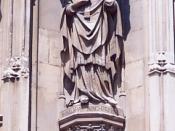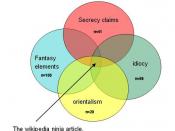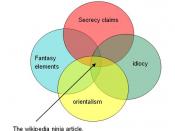The topic I will be discussing in this essay is whether or not the ontological, the cosmological, or the teleological arguements provide sufficient evidence to prove the existence of the Supreme Personal Being. All three arguements have points for and against them, but whether they prove the existence of God (from here on out taken to mean the Supreme Personal Being) or not remains still to be a topic of debate.
The weakest of the three arguements is the ontological arguement. The Christian theologianAnselm(1033-1109) believed that we can concieve of the greatest possible being, and this becomes he basis for his arguement. He says that existence in reality is greater than existence in the mind. If this is so, then the greatest possible being that we can concieve in our minds is not the greatest possible being because we can also concieve of the same being as existing in reality, therefore, the greatest possible being exists.
This arguement makes ambitious assumptions as to what we are capable of concieving, as well as placing limits or "rules" on the types of concieved things that we are allowed to use within this arguement to prove the existence of. Gaunilo, a contemporary of Anselm believed that "one cannot concieve of the greatest possible being."1 He says that we can understand the words "greatest possible being", but that we could not truely understand the being which they represent. One also has to wonder whether we can use Anselm's arguement to prove the existence of all sorts of non-existent things. Lets just suppose that I can concieve of the greatest possible apple. It is the most juicy, perfectly shaped and colored apple I can think of, so therefore it must exist because its existence in reality makes it greater than its existence in...



Good job!
Good scientific paper! Even if i'm not that familiar with these types of papers, I have to admit that i liked yours! It was well written, connected to the theme and very well detailed! Good Job!
3 out of 3 people found this comment useful.